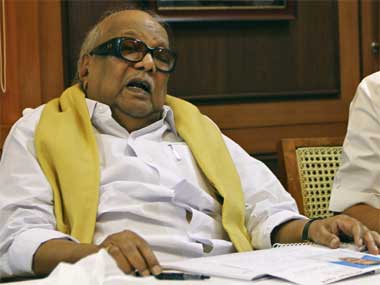If proof were needed that electoral defeat has disjointed DMK leader M. Karunanidhi’s political and social perspective, you only have to tune into his surly outpourings at a recent media briefing. During a borderline-monosyllabic interaction with the media in Chennai, Karunanidhi responded to a question on the reasons for his electoral defeat with a line that takes him right back to the caste-baiting politics of the 1960s. Question: Was the (2G) spectrum issue the reason for the defeat in the election? Karunanidhi’s answer: No, the efforts of some Brahmins was the important reason for the defeat of the DMK [caption id=“attachment_9339” align=“alignleft” width=“380” caption=“M. Karunanidhi overstates the influence of caste-based identity politics in today’s Tamil Nadu. Babu Babu/Reuters”]  [/caption] That, and Karunanidhi’s other snarky responses to questions from mediapersons, point to a chronologically advanced man who is deeply grieving over the dramatic turnaround in his personal, familial and political fortunes in just the past two years – and who has yet to come to terms with the stunning nature of his recent defeat. Karunanidhi’s claims about the influence of Brahmins – or indeed of “forward caste” communities - in Tamil Nadu today are easily disproved. Tamil Nadu has for decades witnessed politics centred around anti-Brahminism. The Self-Respect Movement founded by Periyar began as a progressive movement for the advancement of “lower castes”, and did secure social advancement for some of the most socially backward communities Indicatively, Tamil Nadu has the highest percentage (69%) of resevations for ‘backward’ castes– which came into force long before the Mandal Commission institutionalised it at a national level. In Tamil Nadu, Backward Castes (BC) get 30 per cent reservation in educational institutions, Most Backward Castes (MBC) 20; Scheduled Castes (SC) 18; and Scheduled Tribes (ST) one per cent. Since the 1960s, the Dravidian parties have also effectively changed the political discourse in Tamil Nadu, to the point where there is greater political sensitisation and a sense of empowerment among traditionally oppressed communities. Yet, the Dravidian movement has also reduced identity politics revolving around caste to a regressive social phenomenon that has proved socially divisive. So entrenched have caste-based entitlements become that today no political party can hope to campaign against caste-based reservation. As political commentator Cho Ramaswamy noted: “Reservations in Tamil Nadu have been in place seen pre-independence from the time of the Justice Party. The electorate is accustomed to it more than any other state,” he says. All political parties in Tamil Nadu support reservation without opposition. Cho’s teleserial “Enge Brahmanan?” (“Where is the Brahmin?”) showed up the declining influence of Brahmins in the politics and administration of the State. Today, the ‘forward castes’ account for a minuscule proportion of Tamil Nadu’s demographics, and even less in terms of political influence. Although the current Chief Minister, Jayalalithaa, is notionally a Brahmin, she is a product of a Dravidian movement – and entrenched in its caste-based politics. Given his roots in the Dravidian movement, Karunanidhi cannot be unaware of all this. Which is why his claim that his party’s drubbing at the recent election owed rather more to the efforts of “some Brahmins” shows him up to be hopelessly out of touch – or in abject denial. It also reflects a pitiful throwback to an era of caste-based politics that is becoming increasingly irrelevant. In Tamil Nadu, the real reason for the DMK’s defeat was the universal revulsion directed at Karunanidhi’s family – centred around India’s biggest corruption scandal . Astute voters – from all castes and classes – saw through the DMK’s naked attempts to “bribe” voters with freebies, and threw the party and its leaders out. Unable to reconcile himself to the enormity of that loss, and having to live with the ignominy of seeing his daughter in Tihar jail, Karunanidhi appears to have slipped into a caste coc0on that may have comforted him and earned him electoral dividend in the past – but which stands little chance of gaining him political mileage today.
Dravidian politics’ old fox is grieving over his electoral and personal loss - and is in denial about the universal revulsion against his corrupt party.
Advertisement
End of Article
Written by Vembu
Venky Vembu attained his first Fifteen Minutes of Fame in 1984, on the threshold of his career, when paparazzi pictures of him with Maneka Gandhi were splashed in the world media under the mischievous tag ‘International Affairs’. But that’s a story he’s saving up for his memoirs… Over 25 years, Venky worked in The Indian Express, Frontline newsmagazine, Outlook Money and DNA, before joining FirstPost ahead of its launch. Additionally, he has been published, at various times, in, among other publications, The Times of India, Hindustan Times, Outlook, and Outlook Traveller. see more


)
)
)
)
)
)
)
)
)



